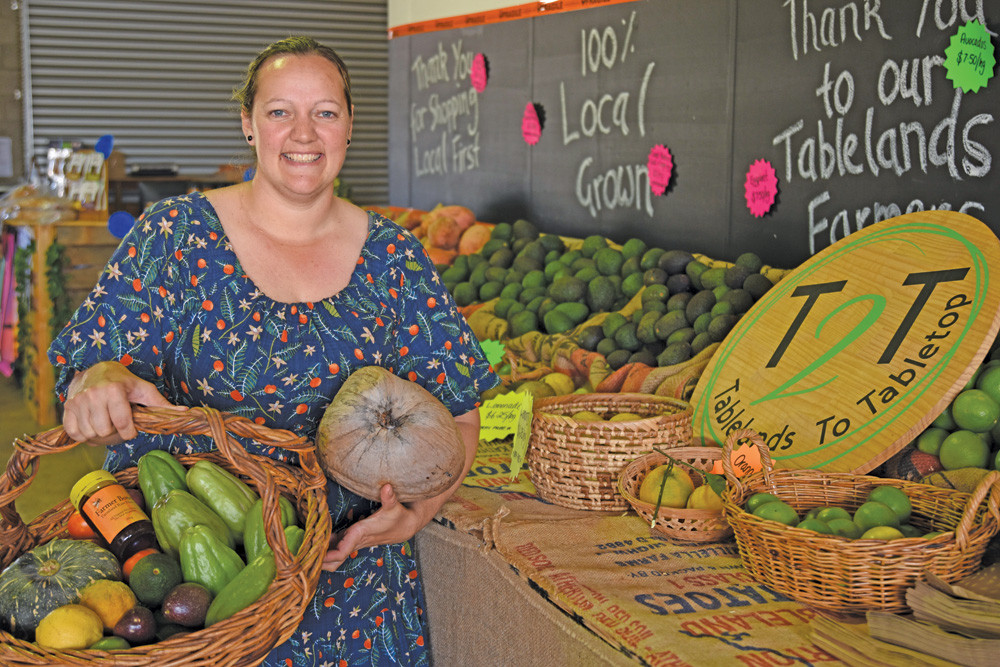Community & Business
28 July, 2023
Innovative ideas to combat food waste
TONNES of locally grown fruit and vegetables are not making it onto supermarket shelves because they are not perfect but the situation has generated innovative thinking of how to move the produce to combat the waste across the Tablelands.

From selling second-grade fruit to the development of by-products such as avocado ice cream, banana flour, dried fruit, wine and even gin flavours, ideas are giving life to fruit otherwise destined for landfill.
Each year, $20 billion is lost to the economy through food waste and up to 25 per cent of all vegetables produced don’t leave the farm.
But for Tablelands to Tabletop (T2T) owner Angela Nason, the situation has turned into a business opportunity that is allowing her to help curb fruit and vegetable waste.
“Being a farmer’s daughter, we ate the rejects, not the pretty stuff,” she said.
“I didn’t really have an understanding of the waste until I saw how much was dumped - a third of the fruit grown never leaves the farm.”
T2T is the accidental business Angela developed during Covid when her father needed to move on excess fruit and asked for her help.
“It all started from there,” she said.
Before long, Angela’s fruit growing family were contacting her also asking for help.
“We did 20 boxes of fruit in the first week, in the second week we did 40 for the week. All of a sudden, I sat down and thought to myself, this would make a good job,” she said.
Angela has now got 150 farmers on the books, has delivered to more than 5000 customers and her shopfront is a bustling place during the week, selling both first and second grade fruit.
She’s now making it her mission to encourage people to consume the not-so-pretty or downgraded fruit and vegetables.
“We were raised to be thankful for what we have and not to be wasteful,” Angela said.
“Never in my wildest dreams did I think I would be selling fruit and veg.
“Give second grade a go. It’s not for everyone but just give it a go. Don’t judge a book by its cover.”
FNQ Growers chair Joe Moro encouraged locals to buy produce that may have a few marks on it.
He said fruit that was too heavily marked, would go off much quicker, but when only small marks were present, the product was no different to eating the top graded items.
“Consumers should not be scared to buy a product that has spots on it. If it’s in the market, it’s okay to eat,” Mr Moro said.
“Angela is doing a fantastic thing. What she is doing is really good. She is capitalising on the fruit that has that blemish.”
Mr Moro felt it wasn’t right to purely blame the consumer but they played a role in fruit and vegetables having to be “perfect” to purchase.
He also said supermarkets knew what their consumers wanted.
“Farmers are struggling with price structure and consumers can be blamed here when it comes to the look of fruit (and vegetables),” he said.
“People want only the best,” he said.
But Mr Moro said a lot of people were doing “interesting stuff” across the Tablelands to add value to what they produce.
There was a really innovative side to some farmers who had chosen to value-add and develop their agri-tourism, which had a flow-on effect for the rest of the community.
“I call selling on the side of the road value-adding,” he said. “People look for stories, what can they tell when they get home,” Mr Moro said.
At one of the largest farming ventures in the region, Rock Ridge Farming, several systems are now in place to move on any fruit that is rejected by the supermarkets.
Operations manager Jess Howe said their fruit was already in Brisbane, Melbourne or even Sydney if and when it was rejected.
“Our marketers will then arrange a transport company to collect the fruit and sell it to another buyer (typically for food services/restaurants) at a heavily reduced price,” she said.
“Although, if the quality issues are significant then we sometimes donate the food to a local foodbank in whichever area the produce is in.”
They work closely with both Woolworths and Coles to sell their produce and are impressed with the education being passed onto consumers.
Ms Howe said the “Odd Bunch” and “I’m Perfect” initiatives had assisted with moving on poorer grade or less favourable sizes of fruit.
“Products that would usually fetch us 50c/kg are now returning approximately $2-$3/kg thanks to these initiatives,” she said.
“The supermarkets are also encouraging and supporting businesses who aim to reduce food waste – such as those companies who purchase poor quality avocados and turn them into oil.
“These companies are on their radar and are very much in line with the supermarkets’ goals of reducing food waste.”


